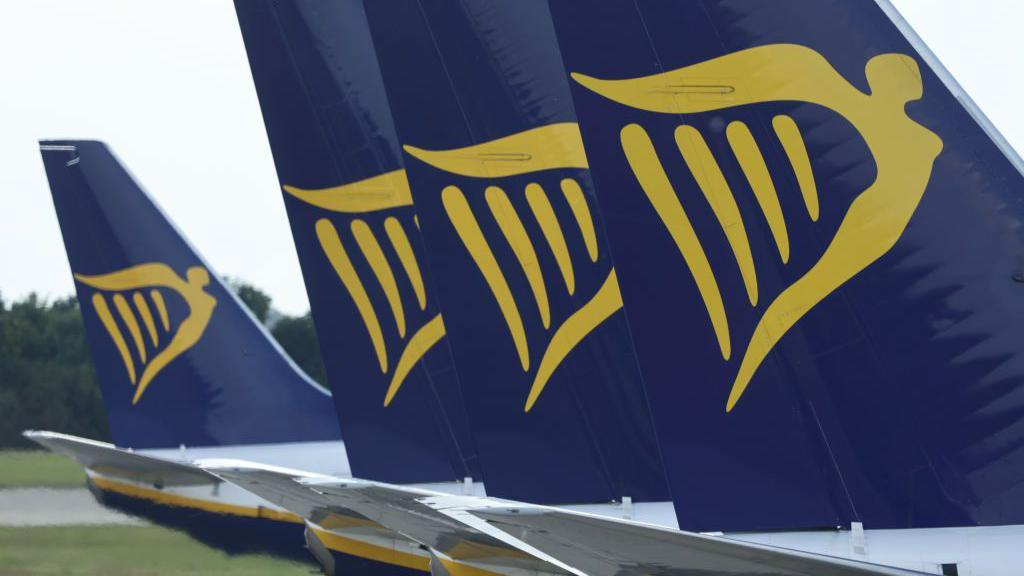Ryanair set to slash summer fares as profits drop

- Published
Ryanair says it expects summer fares will be much lower than last year after profits at the no-frills airline fell by almost 50%.
The company said "frugal" passengers were cutting back while the timing of Easter holidays had also hit earnings, with profit before tax slumping 46% to €401m (£338m) in the three months to 30 June when compared with a year ago.
Average passenger fares fell by 15% in the period, and the carrier said it would have to offer more discounts in the coming months.
"Fares are now moving materially lower than the prior year and pricing... continues to deteriorate," its boss Michael O'Leary said in a presentation announcing its latest results, external.
Shares in Ryanair and other airlines fell sharply as experts questioned whether the wider sector would be affected by customer budgets being squeezed during the peak summer travel period.
Ryanair said it now expected fares between July and September to be "materially lower" than last year, rather than "flat to modestly up" as it previously expected.
The typical Ryanair fare in June stood at €41.93 in June, down from €49.07 the year before.
Chief financial officer Neil Sorahan said he thought that consumers were simply being "a little bit more frugal, a bit more cautious" with their money.
He added that after two years of growth in travel demand, "there's a bit of pushback".
Last minute bookings
Despite the slide in profits, Ryanair's passenger numbers increased slightly, limiting the fall in its overall revenue to just 1%.
However, the weak results may suggest that a post-pandemic boom in pricing enjoyed by airlines could be coming to an end, with other carriers having recently warned over falling ticket prices.
Ryanair said on Monday that its performance over the rest of the summer is "totally dependent" on more last-minute bookings and those in August and September in particular.
Customers are typically waiting longer than usual to book summer holidays, which is thought to be partly a result of the ongoing effects of the cost-of-living crisis.
Earlier in July, Jet2 said there would only be "modest" price increases this summer amid a wave of later bookings to its European destinations.
Lufthansa has also pointed to "negative market trends", while Air France-KLM warned of a financial hit after fewer people than expected booked flights to Paris for the forthcoming Olympic Games.
Ryanair's share price sank 17% on Monday, while other airlines including EasyJet and Wizz Air saw their stock prices drop.
Airlines including Ryanair have been battling with a resurgence in air traffic control strikes causing delays and cancellations, said Dan Coatsworth, investment analyst at AJ Bell.
"Delivering the final punch was the global IT meltdown over the past weekend which affected flights around the world," he added.
"The more people read about delays and cancellations, the more likely a chunk of potential last-minute bookers aren’t going to bother. They might think it’s all too much hassle so they just have a holiday at home."
Mr O'Leary also said on Monday that the aircraft maker Boeing had warned him in recent days that some deliveries of 737 Max planes due by next spring would be delayed until the summer of 2025, potentially straining Ryanair's capacity over the key trading period.
Its expansion plans have been hampered by the delays to the new planes while Boeing has been under intense scrutiny over its production methods and quality control processes.
In January, Boeing was plunged into crisis when a door panel in one of its planes blew out soon after take-off and forced the jet to land.
It continues to face investigations and lawsuits sparked by the incident on the January flight operated by Alaska Airlines.
Ryanair said on Monday that it continues to work with Boeing and had noted an "improvement in the quality and frequency of deliveries".